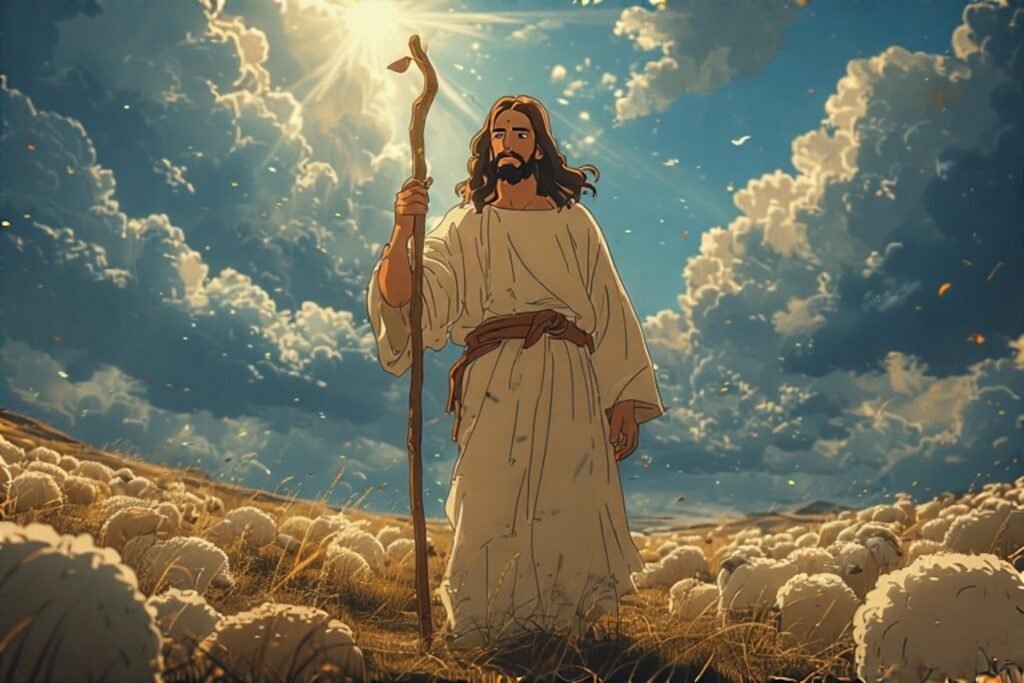A Cry for Rescue, A Glimpse of Redemption
Psalm 80 is one of those hauntingly beautiful laments that echoes through the centuries with unmistakable urgency. It\’s the cry of a broken people—scattered, afflicted, longing for restoration. But hidden in its poetic appeals is something more than desperation: there’s hope. A hope for a Shepherd, a King, a Savior. A hope for the Messiah. Today’s blog post describes how Psalm 80 foreshadows the Messiah and points to Jesus.
As we read the psalm carefully, we begin to notice something extraordinary. The language, the longing, and the imagery all hint toward a figure far greater than any earthly king. The Messiah is not only longed for in Psalm 80—He is prophetically outlined. And for Christians, the connections to Jesus Christ are unmistakable.
Let’s explore the key Messianic signposts in this powerful psalm.
Psalm 80
1 Give ear, O Shepherd of Israel,
You who lead Joseph like a flock;
You who dwell between the cherubim, shine forth!
2 Before Ephraim, Benjamin, and Manasseh,
Stir up Your strength,
And come and save us!3 Restore us, O God;
Cause Your face to shine,
And we shall be saved!4 O Lord God of hosts,
How long will You be angry
Against the prayer of Your people?
5 You have fed them with the bread of tears,
And given them tears to drink in great measure.
6 You have made us a strife to our neighbors,
And our enemies laugh among themselves.7 Restore us, O God of hosts;
Cause Your face to shine,
And we shall be saved!8 You have brought a vine out of Egypt;
You have cast out the nations, and planted it.
9 You prepared room for it,
And caused it to take deep root,
And it filled the land.
10 The hills were covered with its shadow,
And the mighty cedars with its boughs.
11 She sent out her boughs to [e]the Sea,
And her branches to the River.12 Why have You broken down her hedges,
So that all who pass by the way pluck her fruit?
13 The boar out of the woods uproots it,
And the wild beast of the field devours it.14 Return, we beseech You, O God of hosts;
Look down from heaven and see,
And visit this vine
15 And the vineyard which Your right hand has planted,
And the branch that You made strong for Yourself.
16 It is burned with fire, it is cut down;
They perish at the rebuke of Your countenance.
17 Let Your hand be upon the man of Your right hand,
Upon the son of man whom You made strong for Yourself.
18 Then we will not turn back from You;
Revive us, and we will call upon Your name.19 Restore us, O Lord God of hosts;
Cause Your face to shine,
And we shall be saved!
The “Shepherd of Israel”: More Than a Title
The psalm begins,
Give ear, O Shepherd of Israel, You who lead Joseph like a flock (Psalm 80:1).
This title, “Shepherd of Israel,” is not a casual reference—it’s a title loaded with spiritual and royal significance.
In the Old Testament, “shepherd” is often a metaphor for God’s guidance and provision for His people (see Psalm 23). But it’s also a kingly title. David, the shepherd boy turned king, embodied the shepherd-leader ideal. When the psalmist invokes this name, he’s not just calling out to God generically—he’s appealing to the One who rules with compassion, power, and purpose.
Jesus picks up this mantle explicitly in the New Testament when He says,
I am the good shepherd. The good shepherd lays down his life for the sheep (John 10:11).
The longing in Psalm 80 is for someone to guide, protect, and rescue Israel. In Jesus, that longing is fulfilled.
“You Who Dwell Between the Cherubim”: A Call to the Divine King
Psalm 80:1 continues:
You who dwell between the cherubim, shine forth!
This is a reference to the mercy seat on the Ark of the Covenant—God’s symbolic throne on earth in the Holy of Holies.
The psalmist is calling on the enthroned God—the true King above all kings—to reveal His glory and take action. This plea isn’t just for a human leader but for a divine intervention.
In Christian theology, this is exactly what happened in the Incarnation. God didn’t just send a messenger—He came Himself in Jesus Christ, the very presence of God dwelling among us (John 1:14). The one who “dwelt between the cherubim” entered time and space as Emmanuel, God with us.
“Restore Us… and We Shall Be Saved”
One phrase acts like a chorus through Psalm 80, appearing in verses 3, 7, and 19:
Restore us, O God;
Cause Your face to shine,
And we shall be saved!
This is not simply a request for comfort. It’s a plea for salvation. And it hinges on God’s action—if He restores, if He shines His face (a reference to favor and blessing), then salvation is possible.
In Jesus, this promise is realized. The New Testament speaks of Jesus as the radiance of God’s glory (Hebrews 1:3) and the one through whom we are truly restored. The chorus of Psalm 80 is prophetic: salvation will come when God Himself acts through His chosen one.
“The Man at Your Right Hand… The Son of Man”
Psalm 80:17 is one of the most striking verses in the entire chapter:
Let Your hand be upon the man of Your right hand,
Upon the son of man whom You made strong for Yourself.
Here, the psalmist points directly to a singular individual—“the man of Your right hand.” This is the language of royal authority and divine endorsement. To sit at the right hand is to be given power, intimacy, and rulership.
The second line clinches it: “the son of man whom You made strong for Yourself.”
“Son of Man” is the favorite self-title of Jesus in the Gospels. It connects both to His humanity and His divine authority (see Daniel 7:13–14 and Mark 14:62). When the psalmist calls for God to raise up this man and make Him strong, he’s unwittingly pointing to the very one who will be exalted after His resurrection to sit at God’s right hand (Acts 2:33).
Conclusion: A Prophetic Psalm, A Present Savior
Psalm 80 is not just ancient poetry. It’s a divine roadmap to the Messiah, a whisper of the One to come who would embody the Shepherd, the Savior, the Son of Man. Without a doubt, Psalm 80 foreshadows the Messiah and points to Jesus.
For believers today, this psalm is both encouragement and reminder. In moments of darkness, exile, or silence, we can cry out, “Restore us, O God!”—and know that He already has. In Jesus, the Shepherd of Israel came. The man at God’s right hand reigns.
Psalm 80 points forward. And in Christ, that forward promise is fulfilled.
About Raleigh Acupuncture
At Raleigh Acupuncture Associates, we are deeply committed to providing the highest quality professional acupuncture while being rooted in strong Judeo-Christian values of love, faith, kindness, and truth. We guide our practice with compassionate care, where each patient is treated with respect and dignity, regardless of their background, faith, or beliefs. We welcome people from all walks of life and strive to create a warm, inclusive environment promoting healing and holistic wellness. Our dedication to delivering exceptional acupuncture is paired with a genuine love for helping others, making our clinic a place where faith and professional medical care come together for the well-being of every patient.
Next Steps
BOOK NOW to schedule an appointment online.
Meet Our Practitioners (Video).
Learn about all the conditions we treat.
Focus Keyphrase: Psalm 80 Foreshadows the Messiah and Points to Jesus
Image generated with https://perchance.org/ai-text-to-image-generator










